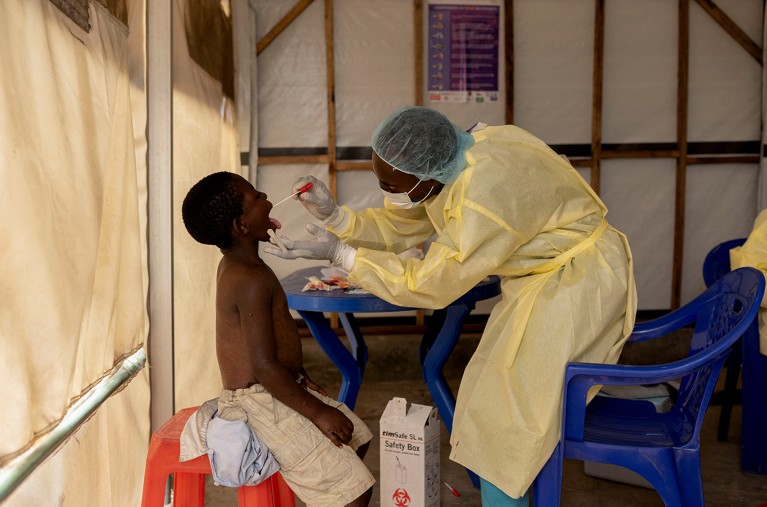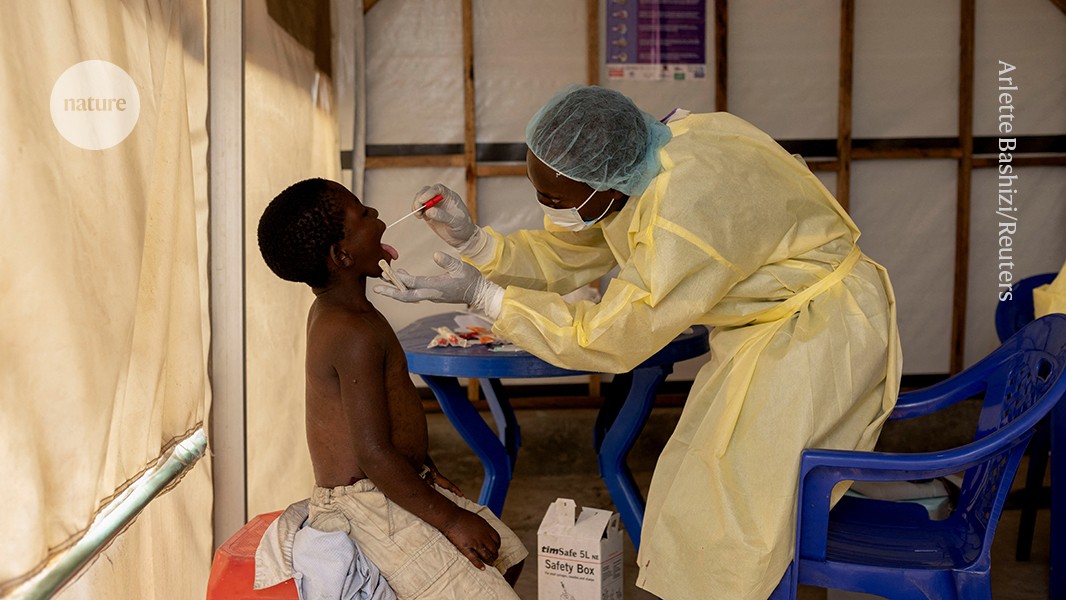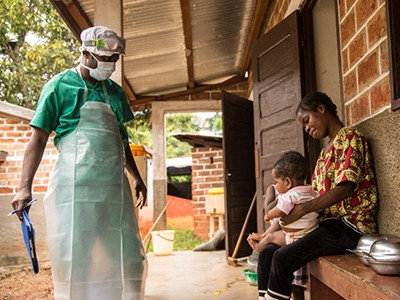
A nurse takes a sample from a child thought to have mpox.Credit: Arlette Bashizi/Reuters
Update: The World Health Organization (WHO) announced on 14 August that it is declaring mpox a ‘public health emergency of international concern’ — just 15 months after the end of the WHO’s previous mpox emergency. The declaration asks the world’s countries to work together and to provide resources to improve surveillance, treat those who are infected and stop the outbreak.
A concerning strain of the monkeypox virus has spread rapidly across Central Africa in the past few months. The outbreak prompted the Africa Centres for Disease Control and Prevention (Africa CDC) to declare its first-ever public-health emergency on 13 August, and the World Health Organization (WHO) is meeting on 14 August to consider a global declaration.
The moves reflect scientists’ deep worry that the outbreak of mpox, the disease caused by the monkeypox virus, could evolve into an epidemic that spreads across the continent — and possibly beyond. They note that the virus is making an alarming appearance not just in rural regions, but also in densely populated areas.
Monkeypox in Africa: the science the world ignored
During the past month, mpox infections have surged in Central Africa, affecting locations including Bukavu, a city in the Democratic Republic of the Congo (DRC) that has more than one million residents, and four countries in the region have reported mpox infections for the first time. These infections are probably connected to an outbreak that began in late 2023 in South Kivu province, a region of the DRC that has been ravaged by violent conflict.
Evidence from past outbreaks indicates that the viral strain spreading in Central Africa is more lethal than the strain that sparked the 2022 global mpox outbreak, which has since infected more than 95,000 people and killed more than 180.
“I hope that we’ve long gotten over the idea that something that is happening somewhere far away can’t affect us,” says Anne Rimoin, an epidemiologist at the University of California, Los Angeles, who has worked on mpox outbreaks in the DRC since 2002. “An infection anywhere is potentially an infection everywhere, and we’ve seen this idea come to bear many times.”
Tender age
African countries have already reported more confirmed and suspected mpox infections in 2024 than in all of 2023: 17,500 this year, compared with about 15,000 in 2023. Children are particularly vulnerable: around two-thirds of infections in the DRC are in people under the age of 15.
Some of these infections have been traced to a strain called clade II, which caused the 2022 outbreak. But over the past few months, an increasing proportion of reported infections have been attributed to a strain called clade I. Clade I has for decades caused small outbreaks in Central Africa, often limited to a few households or communities.
How does monkeypox spread? What scientists know
In April, researchers who analysed samples collected in South Kivu in late 2023 and early 2024 revealed that they had identified1 a clade I variant, called clade Ib, that seems to spread effectively between people through means including sexual contact. Since then, the virus has spread to densely populated areas, presumably carried by highly mobile populations such as sex workers, and to neighbouring countries. South Kivu is also confronting a humanitarian crisis that makes it harder to track and treat infected people, and the DRC is grappling with the aggressive spread of other diseases, such as cholera.
Burundi, Kenya, Rwanda and Uganda have all reported their first-ever mpox infections in the past month, and in a single week in early August, the DRC reported nearly 2,400 suspected infections and 56 deaths. These developments prompted Jean Kaseya, director-general of the Africa CDC in Addis Ababa, to use the power, newly bestowed by the African Union in 2023, to declare a public-health emergency.
The outbreak has also prompted the WHO to call a meeting to discuss whether the outbreak merits a global emergency declaration, which signals to countries worldwide that coordination and preparation might be necessary to control the virus.
Enigmatic viral strain
Mpox causes fluid-filled skin lesions, which can be painful, and, in severe cases, death. It is still unclear whether the symptoms of the clade Ib virus differ from those of the clade II virus that caused the 2022 outbreak, as well as precisely how dangerous and transmissible it is. “That’s the million-dollar question,” Rimoin says.
Can a smallpox drug treat monkeypox? Here’s what scientists know
Although the death rate for clade I mpox is known to be higher than that of clade II mpox, it is hard to pin down the reason, says Espoir Bwenge Malembaka, an infectious-disease epidemiologist at the Catholic University of Bukavu. Beyond the virus’s inherent virulence, many factors could be responsible for clade I’s high death rate: for example, clade I has historically been reported in rural parts of the country with poor access to health care, which could make it more lethal, he says.
Rapidly ramping up surveillance and cooperation between affected countries will be key to bringing the outbreak under control, Bwenge Malembaka says. But treatments and vaccines against mpox, which many high-income countries deployed in the 2022 global outbreak, continue to be almost totally unavailable to African nations.
Vaccines wanted
This might soon change: the Africa CDC is in negotiations with Bavarian Nordic, a biotechnology firm based in Hellerup, Denmark, to obtain 200,000 doses of the company’s two-dose mpox vaccine, Kaseya announced at a briefing on 8 August. But that’s a far cry from the ten million doses that the Africa CDC estimates are needed to stop the current outbreak, Kaseya added.
If and when these negotiations are finalized, much work will still remain to be done: it will be difficult to deliver these doses to regions with poor public-health infrastructure, and to stigmatized populations that are at high risk of contracting mpox, such as sex workers and men who have sex with men, Rimoin says. In addition, the vaccines’ effectiveness against clade Ib is unclear — but, given the dire situation in Central Africa, Rimoin says that shouldn’t delay plans to obtain doses.
Rimoin adds that she hopes that any emergency declaration is not followed by the stockpiling of vaccines and treatments in high-income countries, as occurred during the COVID-19 pandemic and the 2022 mpox outbreak. “It’s critically important to remember that our best bet to control outbreaks is to provide the countries at greatest risk for emergence and spread outward to have the tools needed to control outbreaks at the source,” she says.





